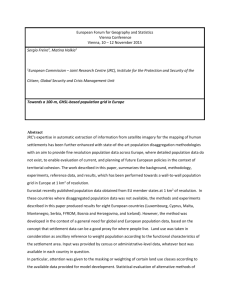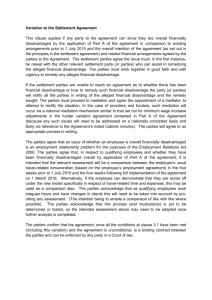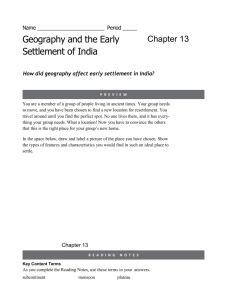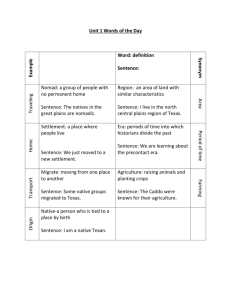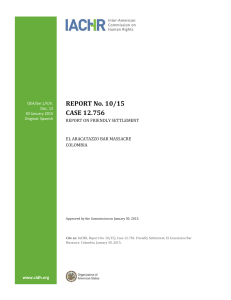Report No. 65/14 - Organization of American States
advertisement
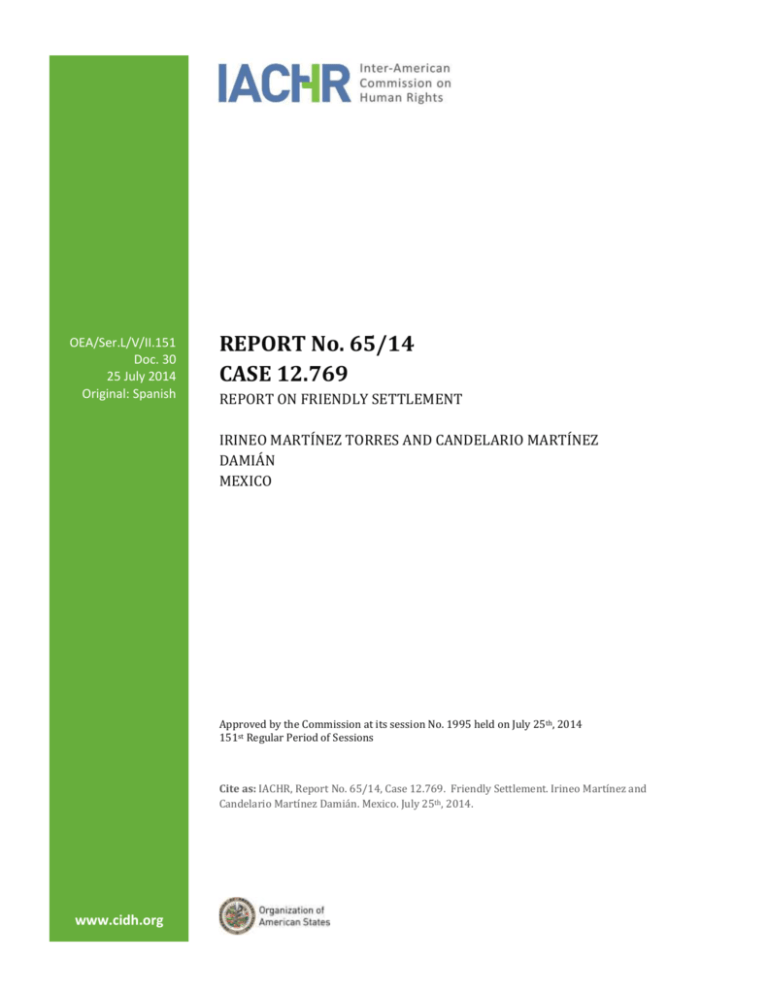
OEA/Ser.L/V/II.151 Doc. 30 25 July 2014 Original: Spanish REPORT No. 65/14 CASE 12.769 REPORT ON FRIENDLY SETTLEMENT IRINEO MARTÍNEZ TORRES AND CANDELARIO MARTÍNEZ DAMIÁN MEXICO Approved by the Commission at its session No. 1995 held on July 25th, 2014 151st Regular Period of Sessions Cite as: IACHR, Report No. 65/14, Case 12.769. Friendly Settlement. Irineo Martínez and Candelario Martínez Damián. Mexico. July 25th, 2014. www.cidh.org REPORT No. 65/14 CASE 12.769 FRIENDLY SETTLEMENT IRINEO MARTÍNEZ TORRES AND CANDELARIO MARTÍNEZ DAMIÁN MEXICO JULY 25, 2014 I. SUMMARY 1. On July 29, 2010, the Commission forwarded to the State of Mexico Admissibility Report 72/10, adopted by the IACHR in its session No. 1833, held on July 12, 2010. 2. On October 27, 2010, once the admissibility stage was completed, the State agreed to start negotiating a possible friendly settlement with the representatives of Messrs. Irineo Martínez Torres and Candelario Martínez Damián. 3. On March 26, 2011, the parties signed, with the support of Commissioner Rodrigo Escobar Gil, a Friendly Settlement Agreement Proposal, and on May 17, 2011, the full proposal for a friendly settlement drawn up by the inter-agency task force was accepted by the petitioners and it was included as part of the agreement of public acknowledgment of responsibility. 4. In the present friendly settlement report, pursuant to Article 49 of the Convention and Article 40.5 of the Commission’s Rules of Procedure, a summary of the facts alleged by the petitioner and of the friendly settlement that was achieved was drawn up. Having reviewed the fulfillment of the commitments made by the parties and their compliance with the principles of the Convention, the Commission decided to adopt the present report, notify the parties, make it public and include it in the Annual Report to the General Assembly of the Organization of American States. II. PROCESSING BY THE COMMISSION 5. On March 13, 2001, the Commission received the petition, 1 which was assigned No. 161-01. On April 25, that same year, as a result of a request made by IACHR, the petitioners provided further information. On October 5, 2001, the Commission forwarded the relevant parts of the information that was received to the State, requesting that it submit its observations within two months. Mexico’s response was received on February 14, 2002. 6. Furthermore, the IACHR received observations from the petitioners on the following dates: October 17, 2001, December 30, 2002, and April 26, 2004. These communications were duly forwarded to the State. 7. Furthermore, the IACHR received observations from the State on February 13, 2004, and the observations made by the petitioner regarding the latter observations were forwarded to the State on May 10, 2006. The State of Mexico did not make any new observations until March 2006, when it requested the IACHR to dismiss the present petition. 8. On October 27, 2010, once the admissibility stage was completed, the parties agreed to start negotiating a possible friendly settlement. Both parties sent a joint communication requesting the IACHR to be at the disposal of the parties to start processing a friendly settlement, pursuant to Articles 38 and 41 of the Rules of Procedure. 1 At the date indicated, the petition that was received was written in English. Afterwards, on June 14, 2001, the Spanish version of this document was received. 1 9. On March 26, 2011, the Inter-American Commission on Human Rights invited the parties to a working meeting during its period of sessions to address matters involving the friendly settlement process. In the framework of that meeting, the parties signed, in the presence of Commissioner Rodrigo Escobar Gil, a friendly settlement agreement proposal. 10. On April 19, 2011, the State reported the establishment of an inter-agency task force in charge of drafting a comprehensive friendly settlement proposal that would take into account the petitioners and their next of kin, but also the community where they lived (Purépecha Community of Ahuirán). In that regard, with the express consent of the representative of the victims, interviews were held with the petitioner and the next of kin of the petitioners and a community assessment was conducted, and this information was included in the case file as an attachment. 11. Afterwards, on May 17, 2011, the friendly settlement proposal was accepted. It included public acknowledgment of responsibility and fulfillment of the agreement formally started. 12. On August 31, 2011, the State of Mexico requested the IACHR to specify the status of Ms. Francisca Alonso Bartolo for the purpose of providing monetary reparations in the framework of the friendly settlement. In view of the death of Mr. Irineo Martínez, it was questioned whether Ms. Alonso, who was not Mr. Martínez’s spouse but the mother of the children they had together, would be entitled to receive said compensation. To this question the Commission replied affirmatively, in line with case law precedents of the IA Court of HR, which has treated both the spouse and the life partner of the victim identically as beneficiaries, for the purpose of distributing compensation. 13. On September 11, 2012, in response to the request for information made by the Commission to the parties regarding the situation of the present case; the State of Mexico requested the following from the Commission: i) Recognize complete fulfillment of all the commitments set forth in the Friendly Settlement Agreement signed by the parties in the case of Irineo Martínez Torres and Candelario Martínez Damián pursuant to the terms specified in the compliance report sent as an attachment; and ii) Declare the definitive archiving of case 12.769 since both the victims and their representatives have stated that they are fully satisfied with the compensation provided according to the terms that were negotiated by them and State representatives. 14. On May 31, 2012, and November 2, 2012, the State sent compliance reports on the commitments made in the friendly settlement agreement. 15. On February 3, 2014, upon the request, the Commission forwarded the following documents to the petitioner: Friendly Settlement proposal submitted by the State on March 7, 2011; Acceptance of the Friendly Settlement proposal by the petitioner on May 17, 2011; Ratification of the friendly settlement agreement of March 26, 2012; a copy of the report on compliance sent by the State on May 31, 2012 and a table with detailed information about compliance with the commitments, and a copy of the Report on Compliance submitted by the State on November 2, 2012. Documents forwarded to the petitioner in order to request their comments and consent to approve and publish the Article 49 report. III. THE FACTS 16. The petitioners claimed that Messrs. Irineo Martínez Torres and Candelario Martínez Damián had been the victims of violations of rights protected by the American Convention when they were arrested and for absence of due process of law during the criminal proceedings filed against them. The alleged victims had been the target of physical aggression by the court police at the time of their detention; during the criminal proceedings brought against them, they had not been provided with an interpreter, although Spanish was not their mother tongue; and the court-appointed defense attorney had not discharged his duties effectively. 2 17. In particular, they alleged that the alleged victims were the members of the Purépecha indigenous people, natives of the locality of Ahuirán, in the state of Michoacán, and that they mother tongue was Purépecha (Tarasco). The asserted that Irineo Martínez Torres, who was 64 years old when the petition was filed with the IACHR, was virtually monolingual when he was arrested. They also stated that Candelario Martínez Damián had learned basic Spanish in elementary school, which he attended for only a few years, and that Purépecha was his prevailing language. They indicated that Irineo and Candelario (uncle and nephew) were widely known as wood craftsmen, which was what they did for a living before their arrest. 18. According to the petitioners, from December 6 to 7, 1997, the alleged victims travelled by bus from Michoacán to Nuevo Laredo, Tamaulipas to close a substantial sale of wooden columns decorated with carvings. The buyers had taken the columns by truck to Nuevo Laredo and had been outside the alleged victims’ control for more than 24 hours. They indicated that, once they were in Nuevo Laredo, the alleged victims headed toward the place where the truck was to unload the columns and get paid. They stated that, shortly after they arrived, they were arrested by agents of the Federal Court Police, who had acted without an arrest warrant, for finding a shipment of marihuana inside the wooden columns. 19. They contended that, during the detention process, the authorities had physically beaten the alleged victims with their fists and kicked them in various parts of the body and that they had hit them with their firearms. They alleged that, in that context, Irineo Martínez Torres had struck his head against the truck, as a result of being pushed by one of the policemen, and that one of his eyebrows had been injured. They alleged that these acts of violence had not been reported immediately, for fear of retaliation. Nevertheless, during a cross-examination between Irineo Martínez Torres and a police officer, Martínez Torres recognized the officer as the person who had hit him. The aggression was also alleged in the Appeal on Constitutional Grounds (Amparo) filed with the Third Collegiate Court of the Nineteenth Circuit in Ciudad Victoria on October 20, 1999. 20. In addition, they stated that the policemen had warned them that they had to admit they were guilty of transporting marijuana in the above-mentioned columns. They pointed out that, because of the alleged victims’ trouble understanding Spanish, Irineo Martínez Torres had not understood the charges brought against them by the police officers, whereas Candelario Martínez Damián had understood enough to declare his innocence. From then until the petition was filed with the IACHR, the alleged victims were held in prison. 21. The petitioners claimed that, as a result of the criminal proceedings that were heard against them, the alleged victims were convicted of the crime against health because of the transport of marijuana, and were given a sentence of 12 years and 8 months imprisonment and fined 4,232 pesos in national currency, as a result of the sentence handed down by the Third District Judge in Nuevo Laredo on June 29, 1998. They indicated that that ruling was upheld by the Fifth Unitary Court of the Nineteenth District in Nuevo Laredo on August 21, 1998. They pointed out that, against this ruling, they filed a Direct Appeal on Constitutional Grounds (amparo) with the Third Collegiate Court of the Nineteenth Circuit in Ciudad Victoria, which was dismissed by a ruling on September 13, 2000. 22. They pointed out that the trial had been conducted only in Spanish, and that neither the court authorities nor the Attorney General’s Office had provided the alleged victims with the assistance of an interpreter, although it was evident that they did not understand what was happening. Furthermore, they alleged that the court-appointed defense attorney had provided ineffectual legal advice, because the defense attorney had not explained the legal proceedings to them; had not requested a translator; had not investigated the circumstances of the arrest; and had not filed the appeal using a standard format. 3 23. They also pointed out that the court authorities had based their case on a police report that had been obtained by the use of violence 2 and had not taken into consideration evidence that would have detract it. They contended that there was no evidence in the court case file that the alleged victims were responsible for the crime. In addition, they argued that the aggression that they had been subjected to during the arrest had not been investigated by the authorities having jurisdiction. 24. The petitioners pointed out that, because of the facts that were reported, the State of Mexico had breached Articles 1, 5, 7, 8 and 25 of the American Convention, to the detriment of the alleged victims. IV. FRIENDLY SETTLEMENT 25. On March 7, 2011, the State submitted a proposal for friendly settlement to the petitioners. When submitting this proposal, the government described this brief as "paper work booked under Federal Law of Transparency and Access to Public Government Information Arts. 13 and 14 on March 7, 2011". The proposal was presented as follows: Irineo Martínez Torres and Candelario Martínez Damián Case 12.769 (Confidential working document in conformity with the Federal Law for Transparency and Access to Public Government Information, Articles 13 and 14, dated March 7, 2011) The State of Mexico, in line with its policy of giving priority to friendly settlements in cases of litigations with the Inter-American Commission on Human Rights when the circumstances of the case allow it, together with the representative of the petitioners in the present case, submits the following friendly settlement proposal for case 12.769 Irineo Martínez Torres and Candelario Martínez Damián, highlighting the following background information: a) On October 5, 2001, the representative of the petitioners, attorney Alfonso Otero, filed a complaint with the State for violation of the human rights of the persons he was representing, Messrs. Irineo Martínez Torres and Candelario Martínez Damián. b) The contentious legal proceedings with the IACHR extended until October 27, 2010, date on which the representative of the petitioners and the State decided to start negotiating a possible friendly settlement. c) At that time, the State set up an inter-agency task force in charge of drafting a comprehensive friendly settlement agreement proposal that took into account the petitioners and their next of kin, as well as the community where they live. d) In that regard, with the express consent of their representative, interviews were conducted with the petitioner and the next of kin of the petitioners and a community assessment was carried out. Both steps provided the basis for the drafting of the present proposal. 2 They alleged, that once arrested, the alleged victims had signed, at the request of a police officer, a document whose contents they were not aware of at the time. They assert that the document had been a ratification of the police report charging them with the crime of drug trafficking. 4 In line with the above-mentioned background, the State of Mexico submitted the following proposal: For the benefit of the Purépecha Community of Ahuirán 1) Bearing in mind that 95.5% of the community is not registered with any health institution, the State pledges to do the following this year: a. Disseminate information about the requirements that have to be met to be admitted into Mexico’s health system. b. Install a health forum in charge of providing advisory services to all persons of the community who request it to guarantee their right to health and, once these requirements have been met, to proceed with their registration (SS, state government). 2) On the basis of the community assessment, it was concluded that there is a large segment of the population of working age affected by the low demand for labor. The State of Mexico urges the Purépecha Community of Ahuirán to organize themselves with their traditional authorities and/or families to draw up a project that would improve the locality’s conditions for the families and community and provide temporary financial support for as many persons as the project requires. This program is being offered to men and women 16 years old and over who wish to implement projects that would contribute to improving family or community conditions. In that regard, the State shall grant, at the request of the party, advisory services to draw up the project and would be able to pay daily wages equivalent to 99% of the minimum wage for the region. In one day, it would be possible to pay two daily wages to the persons working for the benefit of their own community as long as the project lasts, without paying more than 132 daily wages per beneficiary per year. The specific amount of support to be granted by the State of Mexico shall depend on the project that the community itself submits to the consideration of the State and on the number of persons working on it. To this end, the State insists that the Purépecha community organize itself to submit a broad-scoped project for the community (SEDESOL). 3) The State, through the Attorney General’s Office of the Republic, the National Indigenous Language Institute (Instituto Nacional de Lenguas Indígenas—INALI), the Foreign Affairs Secretariat (Secretaría de Relaciones Exteriores—SER), and the National Commission for the Development of Indigenous Peoples (Comisión Nacional para el Desarrollo de los Pueblos Indígenas), pledges to design an informative campaign using various media, including radio and print, so that the Purépecha community can learn about their rights if they are arrested and urging the community to exercise their rights (PGR, INALI, CDI, SER). 4) The State shall conduct a certification program for the training of interpreters in indigenous languages of the State of Michoacán in the field of law enforcement and administration of justice (together with the University of Michoacán, PGR or PGJ, and the Judicial Branch of Government or the 5 Federation), so that those earning the certification diploma can be mainstreamed into the roster of interpreters and translators of indigenous languages, with the Federal Government pledging that they shall promote their use (INALI). Proposals for the benefit of the next of kin of Irineo and Candelario Martínez 5) Onsite interviews with the petitioner and the families of the petitioners indicate that they have traditionally worked as wood craftsmen. Nevertheless, because of their socioeconomic status, they were quickly required to diversify their sources of income. The State of Mexico, recognizing their wish to work exclusively as craftsmen and taking into account that it is because of the absence of inputs and tools that they are prevented from doing so, is offering to rehabilitate the traditional woodworking shops of the two families using the Program to Support Indigenous Productivity and the Program for the Productive Organization of Indigenous Women in amounts that vary depending on the project submitted by the petitioners (DCI, petitioners, and the Municipality of Paracho) and in accordance with what is set forth in the following subparagraph. 6) In compliance with the agreements of March 26, 2011, reached during the 141st period of sessions of the IACHR, the State offers to grant reparations for harm caused in the amount of 500,000 pesos (SEGOB). Regarding this matter, the State stressed that the amount granted by the State of Mexico could be used by the petitioners as they saw fit for their interests. It proposed that half of the amount (250,000 pesos) could be used by the petitioners to invest, together with the CDI (which would contribute about 500,000 pesos) and the Municipality of Paracho (which would contribute about 250,000 pesos) to rehabilitate their traditional woodworking shops for a total investment of about one million pesos and, even then, there would be a surplus of 250,000 pesos to be divided between Mr. Candelario Martínez Damian and the widow of Mr. Irineo Martínez Torres (attached herewith is the investment project with its specific characteristics and precise amounts). If the petitioners were to decide not to accept the proposal made by the State to invest in a joint investment project to rehabilitate their worships and instead wish to obtain the entire amount of the 500,000 pesos to be shared between Mr. Candelario Martínez Damian and the widow of Mr. Irineo Martínez Torres, acceptance of this financial component, together with compliance with the proposals described in the section “For the benefit of the Purépecha Community of Ahuirán” shall suffice to fulfill the obligations of the friendly settlement and, in that regard, proceed with archiving the case. In any case, the amount of 500,000 pesos shall be released in the month of August. 6 26. On May 17, 2011, the comprehensive friendly settlement proposal drawn up by the Interagency Working Group was accepted by the petitioners as follows: May 17, 2011 Minister Alejandro Negrín Director General for Human Rights and Democracy Foreign Affairs Secretariat Subject: Irineo and Candelario Martínez In follow-up to your communication of April 19, 2011, whereby you sent us the official friendly settlement proposal made by the State of Mexico, I believe that the proposed programs are consistent with what was agreed upon on March 26, 2011 at the working meeting held with State authorities during the 141st period of sessions of the InterAmerican Commission on Human Rights, and therefore its contents are hereby accepted. In that regard, the modality for compliance that is of interest for the persons I represent is the one in which the State grants the amount of 500,000 Mexican pesos to the persons I represent, of which 250,000 pesos shall be used to make a joint investment with the CDI (which would contribute 500,000 pesos) to rehabilitate their traditional woodworking shops for a total investment of about one million pesos. The remaining 250,000 pesos shall be divided between Mr. Candelario Martínez and Mrs. Francisca widow of Martínez, who is the spouse of Mr. Irineo Martínez Torres, so that each one of the persons mentioned in the present paragraph would be given the amount of 125,000 pesos. Along this line, the persons I represent hereby accept the joint investment project proposed by the State and therefore pledge to contribute the amount of 250,000, pesos to rehabilitate their traditional woodworking shops as long as the amounts invested by the State of Mexico enable the total investment to amount to one million pesos, on the basis of the following conditions: a) The State must show and pay the amount of 125,000.00 pesos to each one of the persons I represent by August 15, 2011 at the latest. b) The State must begin to take the steps to start the activities aimed at rehabilitating the traditional woodworking shops within 15 days after acceptance of the State’s proposal and shall keep the representative of the petitioners informed of the progress of these activities so that the work can be completed as quickly as possible. c) Likewise, the State must make a public statement in the Community of Ahuirán about the human rights situation at the time of the arrest and trial of Messrs. Irineo Martínez Torres and Candelario Martínez Damian. d) The State must begin implementing the remaining programs within 30 days as of the proposal’s acceptance. e) The State and the petitioners agree that the present proceedings shall not be declared complete, and therefore the friendly settlement finalized, until the above-mentioned items are complied with, the traditional woodworking shops rehabilitated, the working assets and resources for the their functioning distributed, the social program appearing in the final proposal concluded, and all elements of the compensation duly implemented for the benefit of the Community of Ahuirán as specified in the State’s final proposal. 7 In case of noncompliance, the present proceedings shall continue to be processed and the State shall be held liable for the expenditures and costs arising from the litigation of the present complaint, plus compensations pertaining to the parties. Because of the above, compliance with the rehabilitation of the traditional woodworking shops on the basis of a joint investment approach, together with fulfillment of the proposals described in the section “For the benefit of the Purépecha Community of Ahuirán” of the official proposal made by the State of Mexico, shall suffice to fulfill the obligations of the settlement and, in that regard, to proceed with archiving the case. In case of noncompliance, the right to litigate the matter is hereby upheld. Archiving and termination of the present proceedings is subject to due completion of the State’s proposal. Finally, I urge the State to start fulfilling part of the proposal and note that, in case of noncompliance, the right to litigate the matter is upheld. Alfonso Otero Gonzales & Otero, L.L.C. Attorneys at Law V. DETERMINATION OF COMPATIBILITY AND COMPLIANCE 27. The IACHR reiterates that, according to Articles 48.1.f and 49 of the Convention, these proceedings are aimed at “reaching a friendly settlement of the matter on the basis of respect for the human rights recognized in this Convention.” Acceptance to undertake these proceedings highlights the State’s good faith to achieve the purposes and goals of the Convention by virtue of the principle pacta sunt servanda, whereby States must fulfill their treaty obligations in good faith. It also wishes to reiterate that the friendly settlement proceedings envisaged in the Convention make it possible to terminate individual cases in a way that is not contentious, and it has proven, in cases in several countries, to be an important vehicle for settlement that can be used by both parties. 28. The Inter-American Commission has closely followed the evolution of the friendly settlement achieved in the present case and highly commends the efforts made by both parties to reach a settlement that is compatible with the goals and purposes of the Convention. 29. On May 31, 2012 and November 2, 2012, the State provided information on the implementation of their commitments. First, in terms of expanding the coverage of health services, the State informed that gave full effect to this commitment. It reported that on March 26 and April 3, 2012, staff of the Ministry of Health of Michoacán conducted brigades of incorporation that resulted in the registration of 44 families the health system and the beginning of 53 procedures membership therein. 30. Regarding the draft of temporary employment, the advice was given to the municipal authorities of Paracho, in a high-level meeting on May 2, 2012. The State and representatives of the Ministry of Social Development (SEDESOL) reiterated their readiness to continue providing advice for the eventual development of a project. As reported by the state this commitment would be met in full. 31. Regarding compliance for conducting an information campaign on rights at the time of arrest for the Purepecha community, the Attorney General's Office initiated the "PGR Serving the People" program, a seminar "Access of indigenous communities to the administration of justice;” talks on crime prevention and reduction of drug demand, which concluded with a participatory play entitled “I laugh at addiction," addressed to 250 students from various high schools and secondary schools in the town of Paracho, Michoacán; participated in a program of community radio in Ahuiran in which the issue of crime prevention and addictions, attention to victims and indigenous rights at the time of arrest was treated. In this program, 8 two experts in the Purepecha language interpreters translated a booklet with information on indigenous rights at the time of arrest. From the Spanish text of the referred booklet, the Department of Intercultural Communication from the National Commission for the Development of Indigenous People (CDI) produced four capsules audio which began to be broadcast from August 8 of this year via the Cultural Indigenist Broadcasting XEPUR "Voice of P'urhépechas" Cheran. In view of the above, the State reports that it complied in full with this commitment. 32. As for the training of interpreters in indigenous languages in Michoacán, the State reported that the interpreter candidates were trained for the evaluation on 28 and 29 April 2012. On March 14, 2012, the Attorney General of the Republic signed a collaboration agreement with the National Institute of Indigenous Languages for the access to the National Registry of Interpreters in Indian Languages. From 16 to 20 July, 2012, the government of Mexico carried out a process for evaluation and eventual certification of 12 candidates according to the standard set by the National Institute of Indigenous Languages (INALI) on competition of oral interpretation Purepecha language into Spanish and vice versa in the field of enforcement and administration of justice. Therefore, the State indicated that this commitment would be met in full. 33. Regarding the commitment to rehabilitate craft workshops, the State reported that on July 30, 2012, it delivered the rehabilitated craft workshops to Mr. Candelario Martinez and to Mr. Irineo Martinez’s representatives, in the city of Paracho, Michoacan, in the presence of representatives of the Secretary of the Interior, the Ministry of Foreign Affairs, the National Commission for the Development of Indigenous Peoples and the City Hall of Paracho. The construction cost was $ 1,000,000.00 (One million pesos 00 /100) of which $ 500,000 (five hundred thousand pesos 00 / 100 MN) were provided by the Commission in joint investment with Mr. Candelario Martinez Damian and Mrs. Francisca Alonso Bartolo, $ 250,000.00 (two hundred fifty thousand pesos 00/100 MN) for SEGOB and $ 250,000.00 (two hundred fifty thousand pesos 00/100) by the municipal authorities. 34. As for the commitment regarding monetary compensation, it was fulfilled in its entirety. The compensation from the Mexican government to the victims involved in the delivery of a total of $ 500,000 (five hundred thousand pesos 00/100 MN). Which were assigned as follows: - $ 250,000 (two hundred fifty thousand pesos 00/100 MN) delivered by check Mr. Candelario Martinez Damian, the August 3, 2011. - $ 250,000 (two hundred fifty thousand pesos 00/100 MN) delivered via a check to Mrs. Francisca Alonso Bartolo, widow of Mr. Irenaeus Martínez Torres, 26 October 2011. 35. Under the agreement, out of the 500,000 pesos delivered by the Mexican State, 250,000 pesos were invested in conjunction with the National Commission for the Development of Indigenous People (CDI ) for the rehabilitation of craft workshops. According to information provided by the State, for the rehabilitation of artisanal workshops both Mr. Candelario Damián Martínez as Mrs. Francisca Alonso Bartolo contributed 125,000 each for this purpose. 36. Finally, as for the acknowledgment of liability, the State reported that on August 3, 2012, a public ceremony was held in which it assumed its responsibility as a direct reparation measure to the victims. 37. The Commission forwarded the information from both compliance reports received by the State on May 31, 2012 and November 2, 2012, the petitioner requesting their observations, without avail. 38. According to information submitted by the State, the Commission concludes that there is substantial compliance with the commitments made. Regarding programmatic commitments and charitable character, the Commission will continue to monitor compliance. 9 VI. CONCLUSIONS 39. On the basis of the above-mentioned considerations and the procedures set forth in Articles 48.1.f and 49 of the American Convention, the Commission wishes to reiterate its deep appreciation for the efforts made by the parties and its satisfaction at the friendly settlement that was achieved in the present case, based on respect for human rights and compatible with the goals and purposes of the American Convention. 40. By virtue of the considerations and conclusions set forth in the present report, THE INTER-AMERICAN COMMISSION ON HUMAN RIGHTS DECIDES: 1. To adopt the terms of the agreement based on the integral proposal for a friendly solution prepared by the Interagency Working Group (Grupo de Trabajo Interinstitucional) that was accepted by the petitioners on May 17, 2011. 2. To continue monitoring the programmatic and welfare commitments pending compliance by the State of Mexico, and to that end, to remind the parties of their commitment to report regularly to the Commission on its implementation. 3. To publish the present report and include it in its Annual Report to the General Assembly of the OAS. Done and signed in the city of Washington, D.C., on the 25th day of the month of July, 2014. (Signed): Tracy Robinson, President; Rose-Marie Belle Antoine, First Vice President; Felipe González, Second Vice President; Rosa María Ortiz, Paulo Vannuchi and James L. Cavallaro, Commissioners. 10


